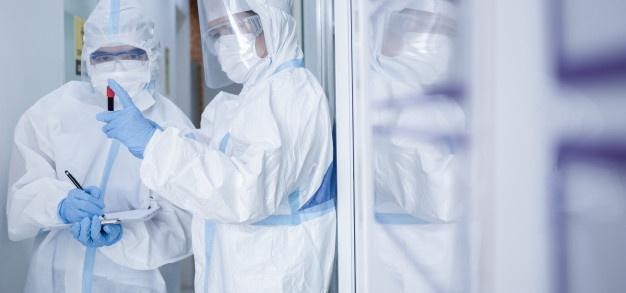Is Coronavirus here to stay?
Unless and until a vaccine is not developed it is possible the new coronavirus may be here to stay. WHO official Dr. Michael Ryan in a press briefing said: “This virus may never go away”. Previously also diseases as HIV had never gone rather their vaccines were developed.
Can the risk of infection be minimized?
Improving immunity is paramount at this point of time. At one click you can order your immune-boosters from online pharmacy UK. The better your immune system, the better you are.
Can wearing a mask protect you against coronavirus?
According to WHO, masks can make an impact only when they are used in amalgamation with proper and frequent hand cleaning with soap and water or alcohol-based hand sanitizer. When in use, avoid touching the mask.
Now let’s glance over Personal protective equipment (PPE), which has today become a vital subject owing to the current COVID-19 (coronavirus) epidemic.
PPE includes but is not limited to gowns/aprons; face shields or goggles, gloves, facemasks, and respirators. Although PPE does not guarantee complete protection and must be used in permutation with precautionary measures such as hand hygiene to be of utmost importance.
Who Needs PPE - Personal Protective Equipment?
Health Care Workers
Using PPE is vital for social services workers, healthcare workers, and other 1st responders like for e.g. emergency medical technicians that are associated directly with patient care and routinely have prolonged, close direct contact with patients with probable or confirmed COVID-19 infection or other bodily fluids.
There is no need of PPE for visitors or employees of healthcare facilities as they do not perform direct patient care or enter the room(s) of patients.
Individuals with Positive or Suspected Cases
The facemask should be used by people who have positive coronavirus symptoms like a cough. This would protect the surrounding people from getting affected.
Healthy Individuals
There is no need for the general public to use PPE routinely for preventing respiratory illness, including Coronavirus. Rather taking precautionary measures can be helpful like:
-
Washing hands with soap (whichever you have at your home) and water.
-
Disinfect and clean touched surfaces regularly. You can clean these surfaces if they are dirty with disinfectant, soap, and water.
-
Do not touch your eyes, mouth, and nose with unwashed hands.
-
Prefer to keep a tissue to cover your cough and sneeze or use your elbow.
-
Do not come in close proximity to sick people.
-
Stay away from school, work, or other people if you are sick and have a cough and fever.
-
Follow guidance from your government and public health officials.
How to use PPE correctly and when do you use PPE?
Gloves
Hand hygiene is very essential before and after using gloves. Gloves help to prevent contamination of healthcare professional’s hands and reduce the spread of pathogens only if:
-
They are used correctly
-
Proper hand hygiene (before and after wear) is given due importance
Dos and Don’ts for wearing gloves
The WHO endorses cleaning your hands and then putting gloves on:
-
Before performing a sterile process
-
When you are bound to come in contact with blood or any bodily fluid
-
When you are caring for a patient during contact safeguards
Take gloves off and sanitize your hands:
-
As and when you find gloves to be punctured or damaged
-
When your contact with blood or any bodily fluid is complete
-
When you are not in contact with any of the patients and his/her surroundings have ended
-
When there is a requirement for hand hygiene
Remember: NEVER EVER wear the same pair of gloves for caring more than one patient!
Gowns
Gowns are classified on the basis of their capability to tolerate penetration by blood or body fluids. Association for the Advancement of Medical Instrumentation defines and classifies gowns that are used in healthcare settings.
-
Isolation Gown – This is a non-sterile gown used for keeping clothing away from getting contaminated. These gowns are fluid resistant so that body fluids stay away from clothing for a short span of time. They are used for the care of patients for splash-generating procedures and on contact precautions. It can be disposable or non-disposable.
-
Procedure Gown – A disposable and non-sterile gown that may be fluid impermeable or fluid-resistant conditional on the amount of body fluids involved in the procedure. E.g. where impermeable gowns should be worn include assisting in vaginal birth and during endoscopy.
Respirators and Masks
N95 respirators and procedure masks if worn correctly can safeguard you from infectious particles and droplets.
-
Isolation Mask/Procedure Mask – This is a disposable mask that protects the person from infectious droplets. You can also get this mask with a built-in face shield to keep you safe from splashes.
-
N95 Respirator – This is a tight-fitting cover that when wore properly fitted to the face protects the person from tiny particles that float in the atmosphere, like measles, chickenpox, and TB. You can easily buy face masks online from the UK pharmacy. The KN95 FFP2 Respiratory Protective Face Mask provides perfect protection from the current coronavirus pandemic. An N95 respirator is envisioned to provide more protection as compared to the procedure mask.
Make sure you follow the “Do’s and Don’ts” for wearing procedure masks and N95 respirators.
Wearing PPEs as per proper recommendations and guidelines can protect you from the present epidemic prevailing.
If you are looking to get reliable PPEs and medications from online pharmacy UK, you are at the correct place. Life Pharmacy is the UK registered online chemist offering a complete healthcare solution since 2007.
For any queries just give us a call on 0207 511 8292 and we will assist you with your needs, even if you don’t find what you are searching for.
Stay Home and Stay Healthy!!






